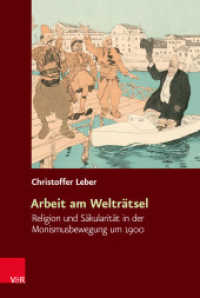- ホーム
- > 洋書
- > 英文書
- > Politics / International Relations
Full Description
Reasserting America in the 1970s brings together two areas of burgeoning scholarly interest. On the one hand, scholars are investigating the many ways in which the 1970s constituted a profound era of transition in the international order. The American defeat in Vietnam, the breakdown of the Bretton Woods exchange system, and a string of domestic setbacks including Watergate, Three-Mile Island, and reversals during the Carter years all contributed to a grand reappraisal of the power and prestige of the United States in the world. In addition, the rise of new global competitors such as Germany and Japan, the pursuit of detente with the Soviet Union, and the emergence of new private sources of global power also contributed to uncertainty. At the same time, within diplomatic history proper, the study of "public diplomacy" has generated searching reappraisals of many of the field's certitudes.This scholarship has now begun to move into a new conceptual maturity with a developing theoretical base underwriting its institutional narratives, borrowing to a great degree from the literature on "Americanization" and the role of American culture abroad in various national and regional settings. Reasserting America in the 1970s brings together these two areas of topical scholarly interest, to study how American public diplomats at home and abroad struggled to maintain American cultural preeminence in a world of shifting challenges to American power.
Contents
Acknowledgements Introduction 1. Introductionin the 1970s (Hallvard Notaker, Giles Scott-Smith, David J. Snyder) 2. Historical Setting: The Age of Fear, Uncertainty, and Doubt (Thomas W. Zeiler) Part I: A New Public Diplomacy for a New America 3. The Devil at the Crossroads: USIA and American Public Diplomacy in the 1970s (Nicholas J. Cull) 4. The Sister-City Network in the 1970s: American Municipal Internationalism and Public Diplomacy in a Decade of Change (Brian C. Etheridge) 5. The Exposure of CIA Sponsorship of Radio Free Europe: The "Crusade for Freedom," American Exceptionalism, and the Foreign-Domestic Nexus of Public Diplomacy (Kenneth Osgood) 6. USIA Responds to the Women's Movement, 1960-1975 (Laura A. Belmonte) 7. "The Low Key Mulatto Coverage": Race, Civil Rights, and American Public Diplomacy, 1965-1976 (Michael L. Krenn) 8. Paintbrush Politics: The Collapse of American Arts Diplomacy, 1968-1972 (Claire Bower) 9. Selling Space Capsules, Moon Rocks, and America: Spaceflight in U.S. Public Diplomacy, 1961-1979 (Teasel Muir-Harmony) Part II: The World Responds to a Reassertive America 10. America's Public Diplomacy in France and Italy during the Years of Eurocommunism (Alessandro Brogi) 11. Selling America between Sharpeville and Soweto: the USIA in South Africa, 1960-1976 (John C. Stoner) 12. Selling the American West on the Frontier of the Cold War: The US Army's German-American Volksfest in West Berlin, 1965-1981 (Benjamin P. Greene) 13. Unquiet Americans: The Church Committee, the CIA and the Intelligence Dimension of US Public Diplomacy in the 1970s (Paul M. McGarr) 14. Time to Heal the Wounds: America's Bicentennial and U.S.-Swedish Normalization in 1976 (M. Todd Bennett) 15. "Something to Boast About": Western Enthusiasm for Carter's Human Rights Diplomacy (Barbara Keys) 16. To Arms for the Western Alliance: The Committee on the Present Danger, Defense Spending, and the Perception of American Power Abroad, 1973-1980 (John M. Rosenberg) Afterword 17. Afterword: Selling America in the Shadow of Vietnam (Robert J. McMahon) Contributors Index








